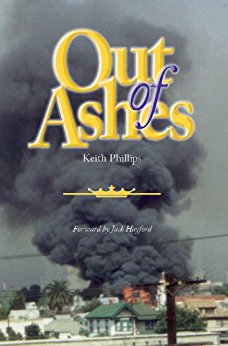Out of Ashes
- Approximate Time Commitment: 10 minutes
OUT OF ASHES by Keith Phillips is a book that focuses on the need of church planting within the poor urban areas within America. This book review was written by Hank Griffith of South Suburban Evangelical Free Church of Apple Valley, Minnesota. This book is good for educating and motivating Christians about the needs of unchurched and poor urban areas within America.
Resource Description
Full Review:
Through my home church’s missions conference in January, I was made aware of Out of Ashes by Keith Phillips, the president of World Impact. World Impact is an inner-city mission committed to planting churches among the unchurched urban poor in America. Though I knew of Dr. Phillips and World Impact, I was not familiar with this book. This readable little book is a great way to educate and motivate American Christians about the tremendous needs – spiritual and otherwise – in our inner cities. Besides presenting many of the issues, the book also gives a biblically and missiologically sound approach to meeting these needs.
Beginning
The first part of the book explores many of the root causes of the 1992 Los Angeles riots by looking at racial and cultural alienation, class alienation, alienation of families, and alienation from God. It might seem that this material is too dated and too Los Angeles specific to be helpful today, but I believe the issues that Phillips raises are still true for the American urban (and increasingly suburban) situation today. My first experience in urban ministry was a month in the inner city of New Orleans during the summer of 1969. Even back then, some of this alienation was visible to me as a recent college grad.
Primary Value
The primary value of the book, however, is not in diagnosing the illness, but in prescribing the cure. The proposed remedy comes out of Phillips’ decades of experience in the inner city of Los Angeles and other urban areas around the United States. In short, the author believes that “the Church of Jesus Christ is the only group ordained by God to be the healing agent in a broken world, the only organization that would certainly be here when Christ returned – the only institution that ever empowered the urban poor.” In this book, you won’t just find theory, you’ll find exciting testimonies of new churches being planted and reproducing themselves. These stories reaffirm the power of the gospel to liberate the urban poor and give them a hope and a future.
Insights
Let me share a few specific insights I appreciated in Out of Ashes. In the ’60s, shortly after Phillips started ministering in Watts (South Los Angeles), he elicited the help of several hundred volunteers from Biola College to work with children. These students had a marvelous ministry! It taught Phillips two important principles: (1) “Whoever spends even a little amount of time with minority children can have a great influence on them; and (2)whoever spends the most time, wins. If every American Christian would build relationships regularly with two or three children from the city, the Church could have a massive influence on the next urban generation.”
In time, after much prayer, study, discussion, and contemplation, Phillips and his associates concluded that the best way to make God known in the inner cities was to “evangelize and equip the urban poor to minister to the urban poor.” The focus must be on mobilizing and training locals to reach their own. They need to be involved in evangelism, follow-up, discipleship, and church planting. “As men and women from different racial, ethnic, and cultural groups are reconciled to God, they then can be reconciled to one another. Becoming part of the Church –having a relationship with Jesus and His followers – is the antidote to alienation.”
At first Keith Phillips looked at people in terms of their race and couldn’t understand why, for example, African Americans who came to Christ in the inner city couldn’t fit into culturally diverse middle class suburban churches that had many well-educated blacks. He eventually began to see that the issue is not simply race, but culture. It depends, too, on where someone lives, works, and is educated. As a result, World Impact works hard at planting culturally comfortable churches.
One other important aspect of Urban Impact’s strategy is their structured holistic ministries; they seek to help new believers with housing, job training, food and clothing distribution, schools, camps, and clinics. They’ve found that without these resources, believers can more easily fall away. Phillips writes, “A young person who is employed and attending one of our schools is more likely to resist the pull of the streets and remain faithful to Christ.”
The author shares many other great principles on planting reproducing, culturally-appropriate churches, but I’ll let you discover them for yourself as you read this book. He seeks to demonstrate these principles both from the experience of World Impact and from the New Testament.
Closing quote
I’ll close with a quote, one with which I couldn’t agree more! “If there is a better job than a missionary, I want to know about it. A missionary tells people who have never heard, the best news they will ever hear, and then encourages them to share that good news with others, who will become their brothers and sisters for eternity.”
HG
Only logged in customers who have purchased this product may leave a review.



Reviews
There are no reviews yet.